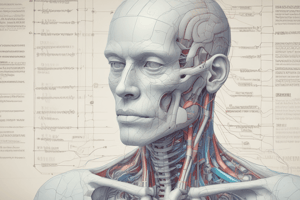Podcast
Questions and Answers
What is strabismus?
What is strabismus?
Deviation in the parallel axes of the two eyes.
What are cataracts?
What are cataracts?
A cloudy area in the lens of the eyes.
What is presbyopia?
What is presbyopia?
Decrease in power of accommodation with aging.
What is nystagmus?
What is nystagmus?
What is bibasilar pneumonia?
What is bibasilar pneumonia?
What does a bruit indicate?
What does a bruit indicate?
What is a thrill in medical terms?
What is a thrill in medical terms?
What is the patella?
What is the patella?
What is tactile fremitus?
What is tactile fremitus?
What is muscular atrophy?
What is muscular atrophy?
What is a pleural friction rub?
What is a pleural friction rub?
What is orthopnea?
What is orthopnea?
What is tinnitus?
What is tinnitus?
What does JVD stand for?
What does JVD stand for?
What is melena?
What is melena?
What is lordosis?
What is lordosis?
What is the Trendelenburg position?
What is the Trendelenburg position?
When should a nurse wear gloves?
When should a nurse wear gloves?
What is the correct order to assess the abdomen?
What is the correct order to assess the abdomen?
What is the best technique used to assess skin turgor?
What is the best technique used to assess skin turgor?
What is a pulse and what does it reflect?
What is a pulse and what does it reflect?
What is a Snellen chart used for?
What is a Snellen chart used for?
What is the difference between an ophthalmologist and an optometrist?
What is the difference between an ophthalmologist and an optometrist?
What are the ROM capabilities of the lower extremities?
What are the ROM capabilities of the lower extremities?
When is the stethoscope diaphragm used?
When is the stethoscope diaphragm used?
What is the assessment order for all body systems except the abdomen?
What is the assessment order for all body systems except the abdomen?
What is receptive aphasia?
What is receptive aphasia?
What is expressive aphasia?
What is expressive aphasia?
What are common body positions?
What are common body positions?
Flashcards are hidden until you start studying
Study Notes
Terms
- Strabismus: Eyes are not aligned.
- Cataracts: Clouding of the eye lens.
- Presbyopia: Difficulty focusing on close objects due to age-related lens changes.
- Nystagmus: Rapid, involuntary eye movements.
- Bibasilar pneumonia: Abnormal lung sounds at the base.
- Bruit: Sound of turbulent blood flow in an artery.
- Thrill: Vibrations felt over a loud heart murmur.
- Patella: Kneecap.
- Tactile Fremitus: Vibrations felt through the chest wall during speech.
- Muscular Atrophy: Muscle loss or wasting.
- Pleural Friction Rub: Lung sound created by inflamed pleural layers rubbing together.
- Orthopnea: Difficulty breathing when lying flat.
- Tinnitus: Perception of sound without an external source.
- JVD (Jugular Vein Distention): Swelling of the jugular vein in the neck.
- Melena: Black, tarry stool indicating blood in the gastrointestinal tract.
- Lordosis: Increased forward curve of the spine.
- Trendelenburg: Supine position with the head lower than the feet.
Nursing Practice
- Gloves: Wear gloves when handling bodily fluids.
- Abdominal Assessment: Order is inspection, auscultation, percussion, palpation (IAPP)
- Skin Turgor: Pinch the skin to assess its elasticity.
- Pulse: Reflects the heart rate.
- Snellen Chart: Measures visual acuity.
- Ophthalmologist vs. Optometrist: Ophthalmologist is a medical doctor specializing in eye care, while an optometrist is a non-medical professional who provides vision care.
- Lower Extremity ROM: Assess flexion, extension, abduction, adduction, internal and external rotation.
- Stethoscope Diaphragm: Used for high-pitched sounds (e.g., heart and lung sounds), while the bell is used for low-pitched sounds (e.g., heart murmurs).
- Assessment Order: Generally, the order is inspection, palpation, percussion, and auscultation (IPPA).
- Receptive Aphasia: Difficulty understanding spoken or written language.
- Expressive Aphasia: Difficulty expressing oneself through speech or writing.
Patient Positions
- Supine: Lying flat on the back – Suitable for many procedures, including abdominal surgery, head-to-toe assessments, and vaginal examinations.
- Prone: Lying flat on the abdomen – Useful for spinal surgery, eye damage, secretion management, and gas exchange.
Studying That Suits You
Use AI to generate personalized quizzes and flashcards to suit your learning preferences.




